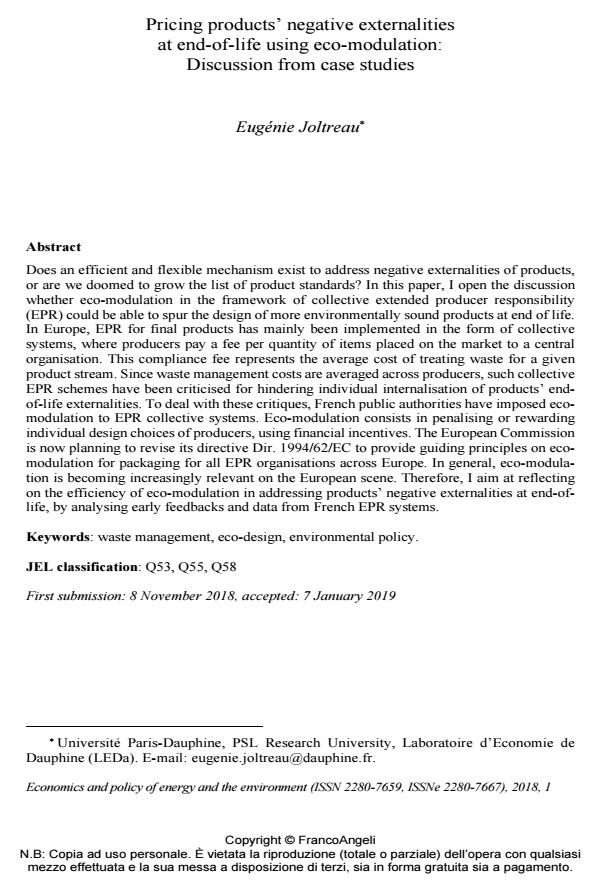Pricing products’ negative externalities at end-of-life using eco-modulation: Discussion from case studies
Titolo Rivista ECONOMICS AND POLICY OF ENERGY AND THE ENVIRONMENT
Autori/Curatori Eugénie Joltreau
Anno di pubblicazione 2019 Fascicolo 2018/1
Lingua Inglese Numero pagine 24 P. 149-172 Dimensione file 463 KB
DOI 10.3280/EFE2018-001007
Il DOI è il codice a barre della proprietà intellettuale: per saperne di più
clicca qui
Qui sotto puoi vedere in anteprima la prima pagina di questo articolo.
Se questo articolo ti interessa, lo puoi acquistare (e scaricare in formato pdf) seguendo le facili indicazioni per acquistare il download credit. Acquista Download Credits per scaricare questo Articolo in formato PDF

FrancoAngeli è membro della Publishers International Linking Association, Inc (PILA)associazione indipendente e non profit per facilitare (attraverso i servizi tecnologici implementati da CrossRef.org) l’accesso degli studiosi ai contenuti digitali nelle pubblicazioni professionali e scientifiche
Does an efficient and flexible mechanism exist to address negative externalities of products, or are we doomed to grow the list of product standards? In this paper, I open the discussion whether eco-modulation in the framework of collective extended producer responsibility (EPR) could be able to spur the design of more environmentally sound products at end of life. In Europe, EPR for final products has mainly been implemented in the form of collective systems, where producers pay a fee per quantity of items placed on the market to a central organisation. This compliance fee represents the average cost of treating waste for a given product stream. Since waste management costs are averaged across producers, such collective EPR schemes have been criticised for hindering individual internalisation of products’ end-of-life externalities. To deal with these critiques, French public authorities have imposed eco-modulation to EPR collective systems. Eco-modulation consists in penalising or rewarding individual design choices of producers, using financial incentives. The European Commission is now planning to revise its directive Dir. 1994/62/EC to provide guiding principles on eco-modulation for packaging for all EPR organisations across Europe. In general, eco-modulation is becoming increasingly relevant on the European scene. Therefore, I aim at reflecting on the efficiency of eco-modulation in addressing products’ negative externalities at end-of-life, by analysing early feedbacks and data from French EPR systems.
Parole chiave:Waste management, eco-design, environmental policy.
Jel codes:Q53, Q55, Q58
- Restoring the incentives for eco-design in extended producer responsibility: The challenges for eco-modulation Reid Lifset, Harri Kalimo, Antti Jukka, Petrus Kautto, Mirella Miettinen, in Waste Management /2023 pp.189
DOI: 10.1016/j.wasman.2023.05.033 - Addressing post-consumer textile waste in developing economies Pammi Sinha, D. G. K. Dissanayke, R. P. Abeysooriya, B. H. N. Bulathgama, in The Journal of The Textile Institute /2022 pp.1887
DOI: 10.1080/00405000.2021.1954428 - Textile industry sustainability: Unpacking the potential of EPR for circular practices Anna Pettini, Luca Montini, in RIVISTA DI STUDI SULLA SOSTENIBILITA' 2/2024 pp.87
DOI: 10.3280/RISS2024-002006 - A green COVID-19 recovery of the EU basic materials sector: identifying potentials, barriers and policy solutions Olga Chiappinelli, Timo Gerres, Karsten Neuhoff, Frederik Lettow, Heleen de Coninck, Balázs Felsmann, Eugénie Joltreau, Gauri Khandekar, Pedro Linares, Jörn Richstein, Aleksander Śniegocki, Jan Stede, Tomas Wyns, Cornelis Zandt, Lars Zetterberg, in Climate Policy /2021 pp.1328
DOI: 10.1080/14693062.2021.1922340 - Policy pathways utilizing extended producer responsibility and eco-modulation frameworks for sustainable food packaging waste management in India: A review Amrita Dey, Denis Ashok S, in Results in Engineering 104885/2025 pp.104885
DOI: 10.1016/j.rineng.2025.104885
Eugénie Joltreau, Pricing products’ negative externalities at end-of-life using eco-modulation: Discussion from case studies in "ECONOMICS AND POLICY OF ENERGY AND THE ENVIRONMENT" 1/2018, pp 149-172, DOI: 10.3280/EFE2018-001007